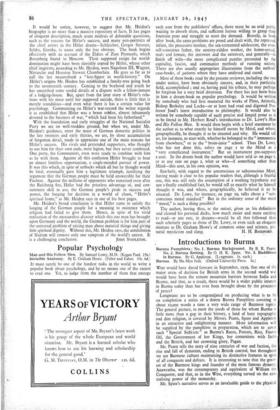Popular Psychology
Man and His Fellow Men. By Samuel Lowy, M.D. (Kegan Paul. 15s.) Invisible Anatomy. By E. Graham Howe. (Faber and Faber. 10s. 6d.)
IT must surely be one of the hardest tasks in the world to write a popular book about psychology, and by no means one of the easiest to read one. Yet, to judge from the number of them that emerge each year from the publishers' offices, there must be an avid public waiting to absorb them, and sufficient heroes willing to grasp their fountain pens and struggle to meet the demand. Bravely, in book after book, the same problems are posed and dealt with, the repressed infant, the possessive mother, the sex-tormented adolescent, the over- self-conscious father, the anxiety-ridden worker, the homo-sexual, male and female, the introvert and the extrovert, and generally—to finish off with—the more complicated puzzles presented by the capital*, fascist, and communist methods of running society. There are also usually appropriate illustrations from the authors' case-books, of patients whom they have analysed and cured.
Most of these books read by the present reviewer, including the two under notice, have been obviously sincere, and, in their particular field, accomplished ; and so, having paid his tribute, he may perhaps be forgiven for a very brief diversion. For there has just been born in him a dream-book on popular psychology. It would be written by somebody who had first mastered the works of Plato, Aristotle, Bishop Berkeley and Locke—or at least had read and digested Pro- fessor Joad's latest introduction to philosophy. It would also be written by somebody capable of such precise and limpid prose as is to be found in Mr. Herbert Read's introduction to Dr. Lowy's Man and His Fellow Men. It would then begin with a brief statement by the author as to what exactly he himself meant by Mind, and where, geographically, he thought it to be situated and why. He would tell us, for instance, to start with, whether he belonged to the " immanence from elsewhere," or to the " brain-juice " school. Thus Dr. Lowy, who has not done this, refers on page r to the Mind as a "very complicated instrument." But an instrument pre-supposes a user. In the dream book the author would have told us on page a, or at any rate on page 2, what or who—if something other than Mind—this user, in his own opinion, was.
Similarly, with regard to the unconscious or subconscious Mind, having made it clear to his popular readers that, although a fruitful one, this was still only the assumption of a working hypothesis and not a finally established fact, he would tell us exactly what he himself thought it was, and where, geographically, he believed it to be situated. Dr. Lowy, for instance, on page to, talks about a "sub- conscious moral standard." But in the ordinary sense of the word " moral," is such a thing possible?
The author, having thus, at the outset, given us his definitions and cleared his personal decks, how much easier and more exciting t3 read—at any rate, in dreams—would be all that followed than such scholarly pages as those of Dr. Lowy, or even such an eloquent mixture as Dr. Graham Howe's of common sense and science, pic-


























 Previous page
Previous page